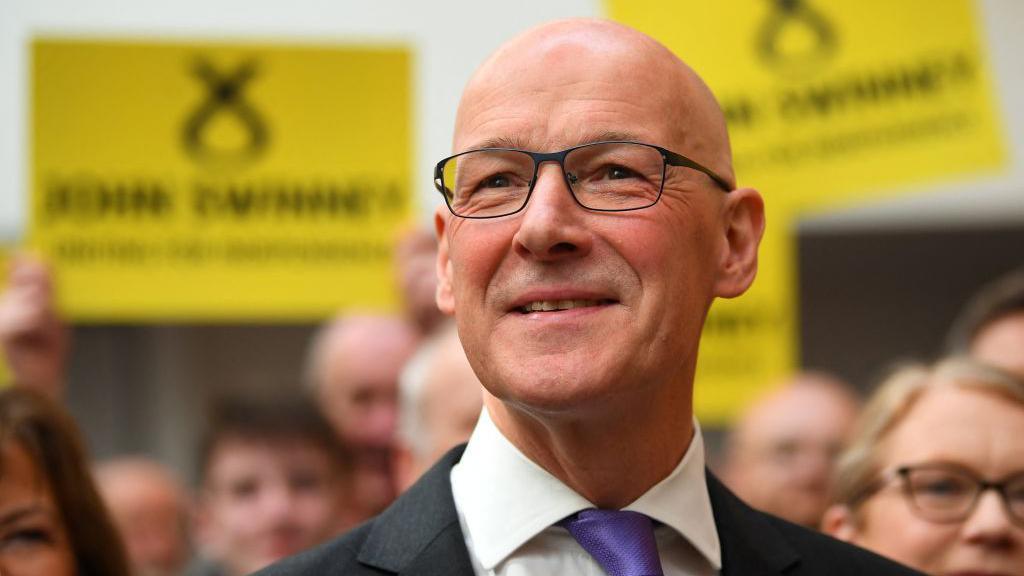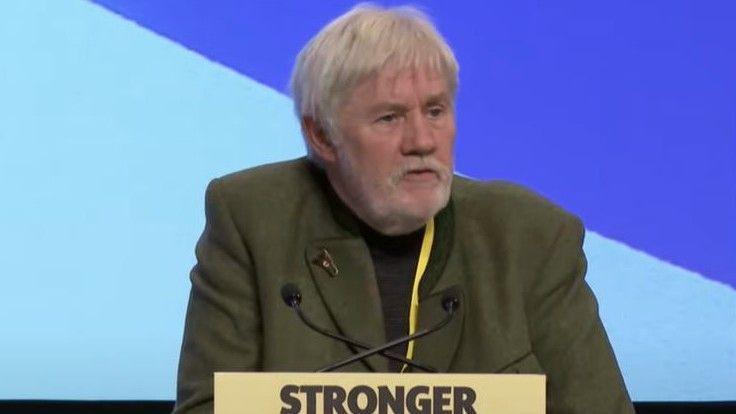Swinney to become SNP leader after rival drops out

- Published
SNP leadership front-runner John Swinney is expected to succeed Humza Yousaf unopposed after a potential challenger withdrew his bid at the 11th hour.
Earlier it emerged that veteran SNP activist Graeme McCormick, who has been openly critical of the Scottish government, had secured a nomination.
However he then announced that although he had met the threshold of support needed to secure a nomination, he had decided not to proceed and would back Mr Swinney instead.
This came after a “lengthy and fruitful conversation” with Mr Swinney in which Mr McCormick said they had "agreed the challenges" which the SNP, the government and the people faced.
Swinney warns of SNP rebuild delay if leader bid challenged
- Published5 May 2024
Who is John Swinney, the sole candidate for first minister?
- Published8 May 2024
How will Scotland's next first minister be chosen?
- Published6 May 2024
This means Mr Swinney is expected to be elected leader of the SNP after nominations close at midday on Monday.
Mr Yousaf resigned after just over a year in the role following the fallout from the decision to terminate a power-sharing deal with the Scottish Greens.
Mr Swinney announced he was putting his name forward as he gave a speech at an event in Edinburgh last week.
Mr Swinney, 60, previously led the SNP between 2000 and 2004 and said he would not be "interim leader" or a “caretaker,” adding he intended to see out a full term.
On Sunday he suggested that rebuilding the SNP could be delayed if another candidate were to enter the leadership race - though said he would engage with internal party democracy.
His preference, he said, was to "get on with things" as the party had not been as cohesive as it should have been in recent years.
Leadership candidates are required to get 100 nominations from at least 20 local SNP branches before standing in the race.
Mr McCormick is a retired lawyer and stood against Mike Russell to become party president in 2023, losing by 599 votes to 79.
He previously argued for abolishing tax and replacing it with an annual rent on land, and that the route to Scottish independence lay through international treaties, with Scotland dissolving the union immediately if the SNP returned the most MPs in Scotland at a general election.
In a speech at the party conference in October last year, he described the SNP government as being like “flatulence in a trance”.
Late on Sunday, Mr McCormick released a statement saying he and Mr Swinney had "explored new thinking on a range of issues" that would "inspire activists" within the SNP and in the wider independence movement.
Confirming he was backing Mr Swinney, he said: "This is a fresh start for our members and our politicians, and I’m sure that John’s determination to deliver Independence will be rewarded at the forthcoming general election."

Graeme McCormick speaking at the SNP Conference in October
Former SNP leadership candidate Kate Forbes confirmed earlier she was not standing and backed Mr Swinney, having been promised a "significant" cabinet role if he becomes first minister.
If no other candidate meets the nomination deadline, Mr Swinney would be free to seek parliamentary approval to become first minister.
Mr Yousaf has decided to stay on in the role until a replacement is selected.
Once his resignation has been accepted by the King, parliament has 28 days to select a replacement.
There will then be a vote in the chamber to decide the new first minister, which is passed by a simple majority.
The SNP has 63 seats in the parliament, which means it does not have a majority, but the vote is likely to pass regardless.
The parliament's presiding officer then recommends to the King that the winner be appointed as the new first minister.
A swearing-in ceremony at the Court of Session in Edinburgh could take place as early as Wednesday.
At that point, Mr Swinney would officially become first minister.
Greens deal collapse
Mr Yousaf announced his intention to step down from the role last Monday.
He had ended the Bute House Agreement with the Scottish Greens, leaving him short of support for the minority SNP government at Holyrood.
He would have faced two votes of no confidence in his leadership last week had he not stood down.
Yousaf says he 'paid price' for upsetting Greens
- Published1 May 2024
Humza Yousaf quits as Scotland's first minister
- Published30 April 2024
Who is Humza Yousaf? The rise and fall of a first minister
- Published17 December 2024
The Scottish Conservatives dropped their motion after his departure was confirmed, while Scottish Labour's - which was a vote of confidence in the entire government - was defeated with backing from the Greens.
His resignation came 13 months after defeating Ms Forbes and Ash Regan, who has since defected to the Alba Party, in the race to replace Nicola Sturgeon.
He became the first ethnic minority leader of a devolved government in the UK and the first Muslim to lead a major UK party.
In his resignation speech, he said he had “clearly underestimated” the hurt he had caused the Greens by ending the agreement and said his replacement would be tasked with "repairing our relationship across the political divide".